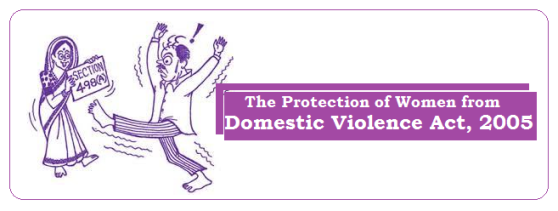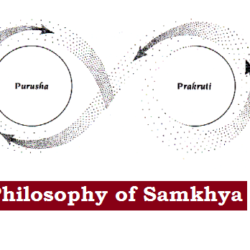
The Protection of Women from Domestic Violence Act (PWDVA), instituted in 2005, is a landmark legislation aimed at protecting women from violence of any kind in domestic relationships. It enshrines principles of the Convention on the Elimination of All forms of Discrimination Against Women (CEDAW), which India ratified in 1993.
‘Domestic relationship’ is not confined to the relationship in the nature of marriage, but it includes other relationship as well such as sisters, mother, etc. The term ‘domestic violence’ has been used for the first time in widest sense which covers all forms of physical, sexual, verbal, emotional and economic abuse that can harm the well-being of the aggrieved woman.
| Table of content |
| 1. Salient Features of the Act 2. Protection of Women under Indian Penal Code (IPC) 3. Questions from CGPSC Mains Examinations |
Salient Features of the Act
Definitions of Domestic Violence: Section 3
‘Domestic relationship’ is not confined to the relationship in the nature of marriage, but it includes other relationship as well such as sisters, mother, etc. It covers all forms of physical, sexual, verbal, emotional and economic abuse that can harm the well-being of the aggrieved woman.
Complaint:
- Apart from the victim herself, neighbors, social workers, relatives can also lodge the complaint regarding domestic violence to the Protection Officer. The offence is considered cognizable and non-bailable. It is applicable for divorced women too as a divorcee husband could resort to violence by entering the workplace of his former wife.
- Duties and functions of Protection Officer: Section 9
- Upon receipt of a complaint of domestic violence, he has to prepare a Domestic Incident Report (DIR) and submit the same to the Magistrate and the police station.
- To ensure that the aggrieved person is provided legal aid under the Legal Services Authorities Act, 1987
- To make available a safe shelter home, if requires and to get the aggrieved person medically examined
- To assist the Magistrate in the discharge of his functions
- If any Protection Officer fails or refuses to discharge his duties as directed by the Magistrate in the protection order, he may be punished with imprisonment up to one year and/or a fine up to Rs. 20,000/-. (Sec 33)
Relief for Aggrieved:
- Counselling: Sec 14
- The Magistrate may, at any stage of the proceedings direct to undergo counselling with a service provider.
- Right to reside in a shared household: Sec 18
- The aggrieved shall have the right to reside in the shared household.
- Protection Order: Sec 18
- The Magistrate may, on being prima facie satisfied that domestic violence has taken place or is likely to take place, pass a protection order in favour of the aggrieved person and prohibit the respondent from possible activities of committing any act of domestic violence.
- Communication with aggrieved person by “personal, oral, written, electronic or telephonic contact” can also be barred.
- Resident Order: Sec 19
- The victim cannot be evicted in the retaliation; even the aggrieved woman can even be allotted a part of the house for personal use.
- Monetary Relief Order: Sec 20
- The Magistrate may direct the respondent to pay monetary relief to meet the expenses incurred and losses suffered by the aggrieved person.
- Custody Order: Sec 21
- The Magistrate may, at any stage of grant temporary custody of any child to the aggrieved person or the person making an application on her behalf.
- Compensation Order: Sec 22
- The Magistrate can make the respondent pay additional compensation and damages for injuries including mental torture and emotional distress caused due to domestic violence.
Penalty:
- Imprisonment up to one year and/or a fine up to Rs. 20,000/- can be imposed for the breach of Protection Order by the respondent.
- Speedy Justice: The act ensures speedy justice as the court has to start proceedings. The Magistrate must have the first hearing within 3 days of the complaint being filed in the court and every case must be disposed of within a period of 60 days of the first hearing.
- Cognizance and Proof: The offence of breach of Protection Order is cognizable and non-bailable. Also, the sole testimony of the aggrieved person is enough for the court to conclude that an offence has been committed by the accused. (Sec 32)
- Punishment for Protection Officer: If any Protection Officer fails or refuses to discharge his duties as directed by the Magistrate in the protection order, he may be punished with imprisonment up to one year and/or a fine up to Rs. 20,000/-. (Sec 33)
Duties of Government: Sec 11; Government shall take all measures to ensure that
- The provisions of this Act are given wide publicity.
- Officers including the police officers and the members of the judicial services are given periodic sensitization.
- Effective co‑ordination between the services provided by concerned Ministries and Departments dealing with law and periodical review of the same.
- Protocols for delivery of services to women under this Act including the courts are prepared and put in place.
Jurisdiction and Appeal:
The court of Judicial Magistrate of the first class or the Metropolitan Magistrate is the competent court to grant a protection order and other orders under this Act and to try offences under this Act. Any order made under this Act shall be enforceable throughout India.
There shall lie an appeal to the Court of Session within thirty days from the date on which the order made by the Magistrate is served.
| Protection of Women under Indian Penal Code (IPC) |
| Indian Penal Code (IPC) criminalizes certain offences derogatory to women and provides for stringent punishment with imprisonment and fine. Section 228A: Punishment for disclosure of identity of the victim of certain offences Sec. 302/304-B: Punishment for Homicide for Dowry, Dowry Deaths or their attempts Sec. 354: Punishment for Molestation (Assault or criminal force to woman with intent to outrage her modesty) Sec. 363-373: Punishment for Kidnapping & Abduction for different purposes Sec. 376: Punishment for Rape with rigorous imprisonment of 7 years to life imprisonment and with fine. Sec. 498-A: Punishment for Torture, both mental and physical Sec. 509: Punishment for Sexual Harassment (Word, gesture or act intended to insult the modesty of a woman) |
| Questions from CGPSC Mains Examinations |
| 2022 Write duties and functions of Protection Officers under the Protection of Women from Domestic Violence Act 2005. (4 marks) घरेलू हिंसा से महिलाओं का संरक्षण अधिनियम 2005 के अंतर्गत संरक्षण अधिकारियों के कर्तव्य एवं कृत्य लिखिए। (4 अंक) |

 Home
Home Syllabus
Syllabus Contact Us
Contact Us








